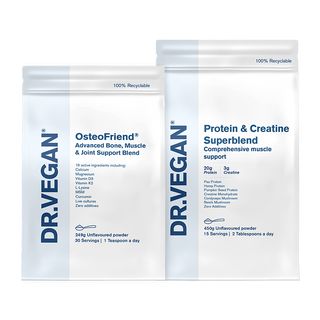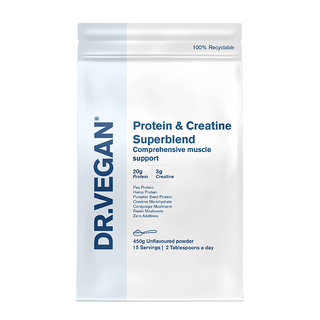Protein and postmenopause: Why it matters more than ever

As we move through perimenopause and beyond, our bodies experience real changes — from hormone fluctuations to shifts in muscle mass, bone density, metabolism, and even brain function. One key nutrient that becomes more important with age is protein. Here we explain why protein matters more than ever after menopause, the best types to choose, and how to include it in delicious, everyday meals.
Why protein intake matters more with age
During perimenopause and postmenopause, natural declines in oestrogen can lead to:
- Muscle loss (sarcopenia)
- Reduced bone density
- Slower metabolism
- Blood sugar imbalances
- Changes in cognitive function and fatigue
Protein helps counteract these effects by:
In short, protein becomes much more than a gym nutrient — it’s a vital part of ageing well and looking after your body for your everyday health.
Understanding the different forms of protein
Not all proteins are the same — here's a quick guide:
| Type | Description | Notes |
|---|---|---|
| Whey | Derived from dairy | Fast digesting; not suitable for vegans |
| Casein | Dairy-based | Slower digesting; not vegan |
| Collagen Peptides | From animal connective tissue | Not a complete protein; not vegan |
| Plant-Based Blends | Pea, hemp, pumpkin, rice. | Suitable for vegans, hypoallergenic |
| Hemp Protein | From hemp seeds | High fibre and contains omega-3s |
| Pea Protein | High in lysine and easy to digest | Common base for vegan blends |
| Pumpkin Seed Protein | Nutrient-dense | Good magnesium, zinc, iron content |
Plant-based protein powders that combine pea, hemp, and pumpkin seed are ideal — they provide a full amino acid profile when blended, the don't cause bloating like other proteins, and they naturally suit clean, healthy, post-menopause diets.
What makes a protein 'complete'?
A 'complete protein' is one that contains all 9 essential amino acids that the body can’t make on its own. Animal proteins are generally complete on their own, and plant proteins need to be combined to become 'complete'. For example, combining pea, pumpkin and hemp protein provides complete protein and can provide more amino acids than an animal protein. A good plant-based blend with 14g-20g of protein per serving can easily provide what you need.
Choose unflavoured protein with zero additives, flavours or sweeteners. Sweeteners like stevia and sucralose disrupt the gut microbiome and can raise glycemic levels, creating imbalances in blood sugar which not only affect your gut but also your mood and energy.
Long-term benefits of a balanced protein intake
Regular, balanced protein intake can help:
- Preserve muscle mass and strength
- Support healthy weight and metabolism
- Improve bone health
- Boost mental clarity and energy
- Enhance immune resilience and recovery
A high, balanced protein intake will also help maintain your hair, skin and nail health, which are often affected during and after menopause. You may enjoy reading: How menopause impacts your skin and hair.
How much protein do menopausal women need per day?
Experts recommend 1.2–1.6 grams of protein per kg of body weight for menopausal and postmenopausal women, which is higher than the general adult recommendation. So if you weigh 65 kg (about 10 stone), aim for 80–100 grams of protein per day, ideally spread across meals and snacks.
Higher protein intake is particularly important for:
What is protein water vs protein powder?
Protein water is a ready-to-drink beverage with added protein — often collagen or whey protein. While these may be convenient, they generally provide too low levels of protein, most are not plant-based, and they don't offer the same nutrient density as a full plant-based protein shake.
Protein powders can be blended into meals or smoothies and offer more control, higher protein per serving, and options that align with your dietary values. Always read the ingredients and look out for additives, flavourings, and sugar, stevia and other artificial sweeteners.
What is the best protein for postmenopause?
For postmenopause the best protein is:
- Plant-based providing a full amino acid profile
- Look for pea, hemp, pumpkin, or other legume proteins)
- Provides 14g-20g per serving
- May have added functional nutrients such as creatine (for muscles, energy, and performance) and mushrooms.
Look for blends that also include:
Comprehensive Bone & Body Support Bundle

DR.VEGAN's Protein & Creatine Superblend contain's protein, creatine and functional mushrooms that work in work in synergy to support your performance, recovery and resilience. This trio is suitable for active individuals, vegans, older adults and anyone looking to enhance energy, focus and recovery — naturally and effectively.
Protein & Creatine Superblend pairs well with OsteoFriend®. OsteoFriend® provides uncompromising support for bone health, suitable for adults and particularly for postmenopausal women.
View our range of award-winning probiotics, vitamins and supplements.
You may also enjoy reading:




















